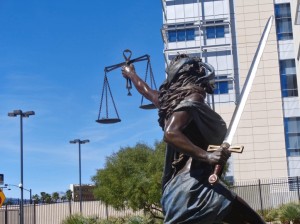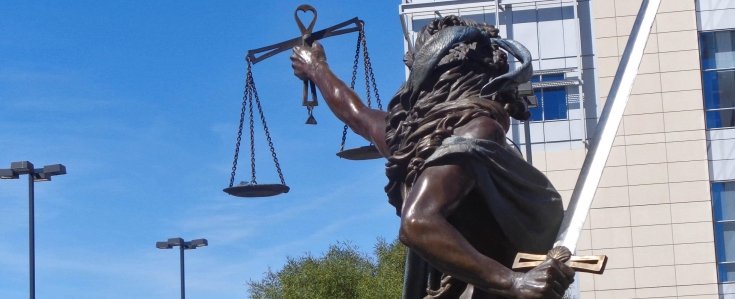Strict Liability and Plagiarism
 In the legal system, strict liability is a concept where a person is held responsible and liable for their actions even though they did not act negligently nor deliberately to cause injury.
In the legal system, strict liability is a concept where a person is held responsible and liable for their actions even though they did not act negligently nor deliberately to cause injury.
A common area this comes up in the United States is with speeding. Whether you intended to speed, were doing so negligently or were even aware of the speed limit is not important. All a prosecutor usually has to do is prove that you were driving above the speed and the case is made.
One area where the concept of strict liability has spread beyond the legal system is with plagiarism. Many schools, publishers, grant providers and other entities have policies that, in effect, make plagiarism a strict liability offense.
This means that, no matter how accidental or unintentional the plagiarism is, the person who commits it is held liable. This means that they can be expelled from school, fired from their job, have their work retracted or a myriad of other punishments levied upon them even if they were unaware they had plagiarized at all.
While that may seem unfair, there are a lot of strong arguments to be made both sides when it comes to strict liability of plagiarism. In fact, it’s likely a situation where there are times where it’s appropriate and times where it is not.
Arguments Supporting Strict Liability in Plagiarism
The biggest argument supporting the idea of strict liability in plagiarism is that the intent of the plagiarist often doesn’t matter.
If a plagiarist made a genuine mistake, most likely it’s going to be a borderline case of plagiarism that wouldn’t be punished severely anyway. The same as Margaret Wente and Fareed Zakaria were not severely punished for her plagiarism because their scandals dealt with small amounts of involved, a plagiarist who makes a mistake will probably have a borderline case that would receive only a small amount of punishment.
That being said, even if a plagiarist makes an error that results in a serious punishment, they likely should have known that what they were doing is wrong. For example, even if a college student didn’t know it wasn’t acceptable to use an essay mill paper for an assignment, they should have known both from their previous education and from the school’s policies.
In short, the onus is on the plagiarists to know what’s required of them.
To make matters more complicated, it’s impossible to know with any certainty what a plagiarist knew or intended. Unintended plagiarism often looks exactly like intentional plagiarism. As such, discussing whether a plagiarists committed the act deliberately is often not just pointless, but impossible.
Finally, the closest legal analogue to plagiarism is copyright infringement and civil copyright infringement in the United States is a strict liability tort (though there is debate about this due to fair use). While innocent infringers face smaller damages, they are still held liable for their actions.
The same, according to many, should be true for plagiarists.
Arguments Against Strict Liability in Plagiarism
On the other side of the coin, plagiarism is considered to be an ethical infraction. One doesn’t punish plagiarism because of the harm it does the author (that’s what copyright infringement is for) but rather, because of the lie it feeds the audience.
Applying strict liability to an ethical offense seems odd. How can you hold someone liable for an ethical infraction they didn’t know or intend to commit? For example, we don’t call someone a liar when they misremember something. If someone did their best to comply with the ethical standards as they understood them, punishing their failings seems strange.
This is especially true in classrooms where education is supposed to be the primary focus. Punishing a student for failing to cite their sources correctly seems cruel when they might genuinely not know or understand the rules of attribution.
The issue is made even more nuanced because the rules of attribution can vary wildly. This is true not just along cultural lines, with some cultures putting much more strict standards on attribution than others, but also medium types. After all, a blog post has a different standard of attribution than an academic paper.
This can create a great deal of confusion as to what is needed in order to not commit plagiarism and its easy for even the most ethical author to run afoul of the standards for the culture or medium they are operating in.
Given just how difficult proper attribution can be, making it a strict liability seems to be a recipe for punishing those confused along with those genuinely trying to cheat the system.
Finding Answers
So, this raises the question: Which should it be?
The answer is that it truly depends on the situation. Just like the rules of attribution and plagiarism can vary from location to location, there needs to be similar flexibility when apply strict liability.
For example, in a middle school classroom, strict liability may be more of a hindrance than a help. Students are still learning the rules on attribution and punishing them for mistakes rather than teaching them is not only cruel, but counterproductive if your goal is to make good researchers.
However, in a newsroom or a doctoral thesis, the rules definitely should change. Any one deserving of being in that position should know the rules of attribution and should be able to exhibit enough caution to avoid making serious mistakes. As such, strict liability makes a great deal more sense.
The same is true for grant funding institutions. If a proposal is plagiarized, it doesn’t really matter if the submitter did it on accident or not, it shouldn’t be accepted.
In short, there are times and places where it is perfectly appropriate to make plagiarism a strict liability offense and other times where it doesn’t. Direction and common sense is what should dictate which is which.
Bottom Line
The important thing is that, whether you’re going to treat plagiarism as a strict liability offense or not needs to be written into your policy on the subject and, after it’s written, it needs to be enforced.
As I said, there are times where it is appropriate and not appropriate, but, either way, it needs to be clear and in writing.
To that end, I’ve written before about the AMBeR plagiarism tariff, a system for metering out plagiarism punishments that’s both flexible and consistent. However, it doesn’t directly address the issue of strict liability, deliberately omitting “extenuating circumstances” from the analysis.
However, that’s not to say that it can’t be revised to include them, it would just mean rewriting the policy and altering the math to calculate the punishment.
Still, the important thing is to decide, for your purpose, whether or not plagiarism is a strict liability offense and then draft policies accordingly. Doing so will save a lot of time and headache, including potential legal headaches.
Want to Reuse or Republish this Content?
If you want to feature this article in your site, classroom or elsewhere, just let us know! We usually grant permission within 24 hours.
